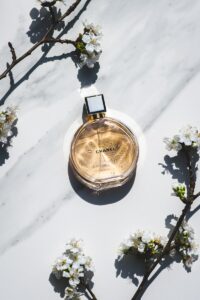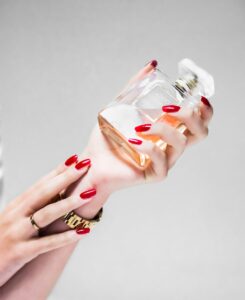Where should I spray perfume? This is a usual question that many people were asking. Perfume oils are an essential part of many people’s daily routine. It can be used to enhance one’s personal favorite fragrance or to create a signature scent that leaves a lasting impression. However, applying perfume or eau de toilette can be tricky, as there are certain areas of the body where it will be more effective and long-lasting than others.
Knowing to wear perfume can make all the difference in how it is perceived and how long it lasts throughout the day. In this context, we will discuss some tips and tricks for where to spray perfume to get the best results.
Where Should I Spray Perfume: 10 Key Spots
There are several key spots on the body where perfume can be sprayed to ensure that natural oils last longer and is more effective. Here are 10 areas where you can spray perfume for the best results:
- The pulse points: These are areas on the body where the blood vessels are closest to the skin’s surface, generating heat and releasing fragrance. The pulse points include the wrists, behind the ears, the neck, the temples, the chest, and the inside of the elbow.

- The hair: Hair is porous and can absorb fragrance, making it an excellent spot to spray perfume. A light spritz on the hairbrush can help distribute the fragrance throughout your locks.
- The collarbone: This area is close to the nose, and a spritz on the collarbone can create a subtle yet effective scent trail.
- The back of the knees: The warmth generated in this area can activate the fragrance and help it to last longer. Try applying unscented body lotion then spray your favorite perfume to make the smell lasts longer.
- The ankles: The pulse point on the ankle is another area where the fragrance can last longer, especially when wearing open-toed shoes.
- The cleavage: A small spritz in this area can create a seductive and alluring scent.
- The back of the neck: Spraying perfume in this area can create a pleasing fragrance trail that people can follow as you walk by.
- The belly button: This area has a lot of warmth and can help activate the fragrance.
- The inside of the thighs: This area generates heat and friction, which can help to activate the fragrance and make it last longer.
- Clothing: Spraying perfume on clothing can help the fragrance to last longer, especially if it is a fabric that holds scent well.
Remember to apply perfume in moderation, as too much can be overwhelming and may cause irritation to the skin. By spraying perfume in the right places, you can create a pleasant and memorable scent that lasts throughout the day.
Where Should You Not Spray Perfume?
While knowing where to spray perfume is important, it is equally important to know where not to spray it. Here are some areas where you should avoid spraying perfume:
- Directly on the face: Spraying perfume directly on your face can cause irritation and even allergic reactions, particularly around the eyes, nose, and mouth. Perfume smells can also irritate your nose. Instead, spray perfume on your hair, clothes, or pulse points and let the fragrance waft up to your face.
- On or near delicate fabrics: Some fabrics, such as silk or lace, can be easily stained or discolored by perfume or eau de cologne. Avoid spraying perfume on delicate fabrics or surfaces, or spray it from a distance.
- On jewelry: Perfume can damage certain types of jewelry, particularly those made of pearls, opals, or other porous stones. Avoid spraying perfume directly on your jewelry and instead spray it on your skin or clothes.
- On open wounds or irritated skin: Spraying perfume on open wounds or irritated skin can cause further irritation and discomfort. Wait until the skin has healed before applying perfume.
- In confined spaces: In confined spaces such as elevators, public transportation, or crowded rooms, the scent of perfume can be overwhelming and cause discomfort or even allergic reactions to those around you. Apply perfume in moderation, and avoid spraying it in confined spaces.
By being mindful of where you spray perfume and where you avoid it, you can ensure that you are using it safely and effectively to enhance your personal fragrance.
Other suggested articles:


